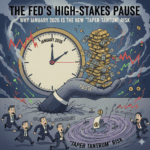The Psychology of Hedge Fund Traders
Hedge fund trading is a dynamic and complex field where success depends not only on market analysis and financial acumen but also on the psychological resilience and emotional intelligence of traders. In this article, we delve into the intricate workings of the human mind in the realm of hedge fund trading, exploring the psychological factors that influence decision-making and trading performance.
Introduction to Hedge Fund Trading
Hedge fund trading involves the management of pooled funds using various investment strategies to generate returns for investors. Unlike traditional investment funds, hedge funds employ more aggressive tactics, including short selling, leverage, and derivatives trading, to maximize profits.
Understanding the Role of Psychology
The psychology of hedge fund traders plays a crucial role in their success or failure. While technical analysis and market trends provide valuable insights, emotions often drive trading decisions, leading to irrational behavior and impulsive actions.
Emotions and decision-making
Fear and greed are two primary emotions that significantly impact trading decisions. Fear of loss can paralyze traders, causing them to exit positions prematurely or avoid taking necessary risks. Conversely, greed can lead to excessive risk-taking and over-leveraging, exposing traders to substantial losses.
Risk Management and Emotional Control
Successful hedge fund traders understand the importance of risk management and emotional control. By implementing disciplined trading strategies and maintaining emotional stability, traders can mitigate losses and capitalize on profitable opportunities even in volatile markets.
Cognitive Biases in Trading
Cognitive biases, or inherent psychological tendencies, can distort judgment and lead to irrational decision-making in trading.
Confirmation Bias
Confirmation bias occurs when traders seek out information that confirms their existing beliefs or biases while disregarding contradictory evidence. This can result in overlooking potential risks or dismissing warning signs in favor of maintaining a preferred outlook.
Loss Aversion
Loss aversion refers to the tendency to prefer avoiding losses over acquiring equivalent gains. Traders may hold onto losing positions for too long, hoping for a reversal, rather than cutting their losses and reallocating capital to more promising opportunities.
Anchoring Bias
Anchoring bias occurs when traders fixate on specific reference points or prices, anchoring their expectations and decisions around these arbitrary values. This can lead to missed opportunities or unwarranted optimism/pessimism based on outdated information.
The Impact of Psychological Factors on Trading Performance
The interplay between psychological factors and trading performance is undeniable. Emotional volatility and cognitive biases can sabotage even the most well-informed trading strategies, resulting in suboptimal outcomes and underperformance.
Strategies for Overcoming Psychological Barriers
To overcome psychological barriers, hedge fund traders must develop robust coping mechanisms and resilience strategies.
Mindfulness and Emotional Regulation Techniques
Practicing mindfulness and emotional regulation techniques can help traders manage stress and maintain clarity of thought during high-pressure situations. Techniques such as deep breathing exercises, visualization, and meditation can foster mental resilience and improve decision-making.
Developing a Trading Plan
A comprehensive trading plan outlines specific goals, risk tolerance levels, and entry/exit criteria for each trade. By adhering to a well-defined strategy, traders can avoid impulsive decisions driven by emotions and maintain discipline in their trading approach.
Seeking Professional Help
In cases where psychological barriers significantly impact trading performance, seeking professional help from therapists or trading psychologists can provide valuable insights and support. Professional guidance can help traders identify underlying issues, develop coping strategies, and improve their overall mental well-being.
Case Studies: Successful Traders and Their Psychological Approaches
Examining case studies of successful hedge fund traders can offer valuable lessons in psychological resilience and effective risk management. By understanding their mindset and strategies, aspiring traders can emulate their success and avoid common pitfalls.
Conclusion
The psychology of hedge fund traders is a multifaceted aspect of trading that profoundly influences decision-making and performance. By recognizing and addressing psychological barriers, traders can enhance their emotional intelligence, mitigate risks, and improve their overall profitability in the dynamic world of hedge fund trading.















